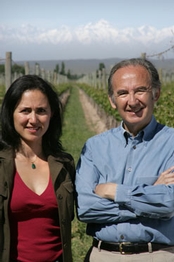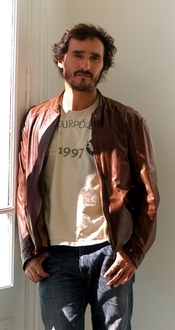Nicolás Catena is widely acknowledged to be the father of contemporary Argentinean wine. He inspired first his native Mendoza region, and then his entire country, to aim for a higher level of wine quality than anyone previously had imagined possible. Today, whether with value-priced brands like Alamos, or the premium-priced, world-class wines produced under his own Catena Alta and Catena Zapata labels, he continues to lead Argentina’s ongoing wine revolution.
Dr. Catena (he holds a PhD in economics) started in his father’s footsteps, but then went his own way. Back in the 1960s and 1970s, Domingo Catena, himself the son of a winemaking Italian immigrant, was a leading producer of old-fashioned (meaning, oxidized) wines for the domestic Argentinean market. Beginning in the mid-1980s, Nicolás turned the family business upside down, producing ever cleaner, fresher, and more compelling varietal wines, and then selling them  internationally. His success turned heads far and wide, bringing new energy, new money, and new vision to Argentinean grape growing and winemaking.
internationally. His success turned heads far and wide, bringing new energy, new money, and new vision to Argentinean grape growing and winemaking.
A new generation is now taking over. As I suspect many readers already know, Nicolás’ daughter, Laura (also a doctor, in her case an emergency room physician), has taken the reins at the family winery, while also running her own operation, Luca. With both endeavors, she quite consciously pays homage to her father’s achievements, building upon his ground-breaking legacy.
Things are a bit more complicated with Nicolás’ son, Ernesto. Rather than work alongside his father and sister, he has gone off on his own, with projects like Tikal, Siesta, and Alma Negra. Yet much like them, he is committed to excellence, and the wines from Ernesto Catena Estates rank among Argentina’s best. A recent visit to his Tikal property to sample the Alma Negra releases made that abundantly clear.
Something of an iconoclast, Ernesto has read extensively in mystic literature and philosophy. He raises llamas to roam his vineyard, has designed a rose garden in lunar alignment, and constructed an extensive vine-labyrinth next to his winery, a place where he says he wants people to “lose themselves and get to know their souls.” Yet, lest you pigeon-hole him as a clichéd free spirit, he also is an avid polo- player, and evidently a fairly shrewd businessman. A software developer, book publisher, and designer, he owns an art gallery as well as a wine bar in Buenos Aires. And of course, he also runs a fast-growing wine business.
player, and evidently a fairly shrewd businessman. A software developer, book publisher, and designer, he owns an art gallery as well as a wine bar in Buenos Aires. And of course, he also runs a fast-growing wine business.
A proponent of biodynamic viticulture (though he sources plenty of conventionally-grown grapes), Ernesto Catena talks about wine in almost spiritual terms. He insists that, like anything of true value, good wine must contain an element of mystery. Two of his best wines are in fact called “Misterio.” Sold under the Alma Negra label, these are red blends of uncertain varietal origin, but unquestioned class and pedigree. The 2006 “Gran Misterio” ($90), in particular, tastes simply stunning. It in fact was the second best wine I tasted on my trip to Argentina, ranking only behind (what else?) his father’s top of the line 2007 Nicolas Catena Zapata.
I have not sampled all of Ernesto Catena’s wines, but other standouts among those I have tried include Alma Negra’s 2010 Viognier ($24) and 2008 Pinot Noir ($30), as well as Tikal’s 2009 “Patriota” ($20, a Bonarda and Malbec blend ). From now on, though, I definitely will be on the lookout for more. Chatting with this gentle yet driven man, it was admittedly difficult to tell how much of his talk of wine’s inherent mystery was conviction and how much hype. Yet there was no doubting the quality in the glass. In his language and world view, Ernesto Catena seems quite unlike his father, whose approach to his business remains much more analytic. Yet in his commitment to world-class Argentinean wine, he clearly is very much his father’s son.
(Wines under the Alma Negra label are imported to the United States by Winebow; the Siesta line is imported by Domaine Select, and Tikal by Vine Connections.)
4
